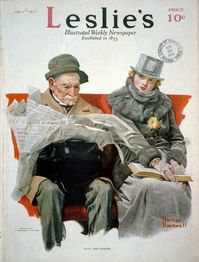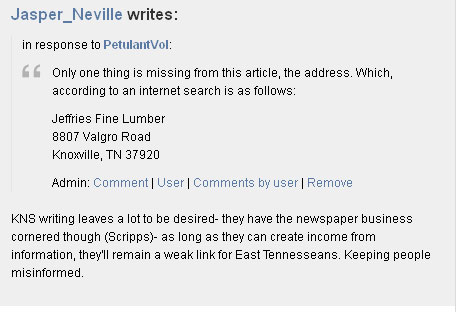Journalism professor Jay Rosen posed this question on Sunday:
@johnrobinson Now if we could only figure out when (for the readers) “our newspaper” became “the” newspaper… When and how… Exactly how.
@johnrobinson I’d love to read an extended blog post by you on that question. And you’re the man to do it. You or @jacklail.
I wasn’t paying attention to my Twitter feed on Sunday so I have the luxury of reading John Robinson’s excellent piece: A death in the family: How “our newspaper” became “the newspaper.” There’s a pretty good discussion going in the comments as well.
 I’m not so sure it’s as Norman Rockwellish as Jay Rosen seems to suggest in the “our paper” vs “the paper” debate. If it is, that may have vanished more than 35 years ago. In a comment on Robinson’s piece, media consultant Terry Heaton suggests maybe it happened in the early ’70s with Watergate.
I’m not so sure it’s as Norman Rockwellish as Jay Rosen seems to suggest in the “our paper” vs “the paper” debate. If it is, that may have vanished more than 35 years ago. In a comment on Robinson’s piece, media consultant Terry Heaton suggests maybe it happened in the early ’70s with Watergate.
Maybe it was even earlier.
Digital news pioneer and former newspaper executive Rusty Coats, now a consultant and science fiction writer, said: “My grandfather took the (Louisville) Courier-Journal (the big-city paper) and The Evening News specifically, I think, so he could cuss at their disconnected idiocy with his coffee-shop cronies.”
Even by the time I entered the newspaper business in the late 1970s half or more of the reporters at the small daily where I began were young whippersnappers from somewhere else and who hoped to go somewhere else. Yes, there were stalwarts who were rooted to the community. But for many, it was just the first stop on the career path.
Even today, whether it’s “the newspaper” or “our newspaper,” people like the validation of seeing their achievements or their children’s achievements “in the paper” — and they are most definitely are not talking about online or just on Faceboook, even if they “like” it there.
I worked at my hometown paper as well, The (Asheboro) Courier-Tribune. It was a small family owned paper. Some people did say “our paper,” but others said it was “Roy Cox’s paper” (the owner). He also owned AM and FM radio stations in town.
When I arrived at my present stop of Knoxville in the mid-80s, it was a place where you could bring in your child on an afternoon and get a birthday photo made for a small donation to a local charity. The photo would run in the paper on Sunday and you’d even get mailed a print. The photo was taken by a photographer who may have taken a prize-winning news photo earlier in the day.
Other fairly large papers had pets of the week, houses of the week, etc.; some still do for that matter. It certainly wasn’t — and still isn’t — all disconnected “Big J” journalism.
There were plenty of people then who said we sucked and the competing paper, The Knoxville Journal, was better. And many who said the opposite.
It was also a place where you could walk in the front door of the newsroom without passing by any locked door or guard and march into editor’s office and try to slug him if you liked (attempted at least once in my memory).
Now, they just berate editors in the website comments, by email or on the phone.
 In the early 80s when my friend Bill Moss was at the Salisbury (N.C.) Post (a great small-town family run newspaper at the time), he ran a summertime “garden game” of prodigious vegetables. By then, North Carolina Senator Jesse Helms was already railing about the evils of the Liberal Media. All award-winning tomatoes are liberals, I guess.
In the early 80s when my friend Bill Moss was at the Salisbury (N.C.) Post (a great small-town family run newspaper at the time), he ran a summertime “garden game” of prodigious vegetables. By then, North Carolina Senator Jesse Helms was already railing about the evils of the Liberal Media. All award-winning tomatoes are liberals, I guess.
But Rosen and Robinson do have a point. The emotional connection to the newspaper as a community institution, or one of the things that defines a community as “our newspaper” in “our community” is fading. it could be labyrinth voice mail systems, paid weddings and obituaries, journalist without roots, or the number of media choices. Or none of those.
Vince Vawter, a former E.W. Scripps editor and publisher turned novelist, said:
“Newspapers became ‘the newspaper’ instead of ‘our newspaper’ when society changed and newspapers didn’t.
“Sunday’s News Sentinel contained at least a half-dozen year-in-review pieces. Tell the truth now, how many of those did you read? I read none, and I’m a newspaper junkie.
Why does The New Sentinel and 95% of the other daily newspapers in the country run these kind of pieces? Answer: Because they always have.”
In an email, he also outlined a “Zip Code Manifesto” in which papers would register some version of newspaperdocom-plus-zipcode, and staff it with one person who sold ads, wrote stories and managed freelance contributions. An idea, he said, he suggested while still with Scripps.
And, Vawter noted, the drift from “our” to “the” isn’t only confined to the news package:
“The horse is already out of the barn on this one, but newspapers lost out (became “the” instead of “our”) when they gave up control of the advertiser. As recently as 10 years ago, the local mom-and-pop advertiser was terrified of that mysterious creature known as the Internet. At that point, newspapers should have gotten into the business of web hosting and web design with a vengeance. Some of us made a few half-hearted attempts, but we weren’t serious because we didn’t want to whittle away at the high-margin print dollars. We lost control and now others, especially social media, are calling the shots.
“In short, we newspaper people thought we would always be loved, respected and trusted. Society turned into a fickle girlfriend always looking for the next blind date. That’s what happened to ‘our’ newspaper.”
Always, it turns out, can be a very short time.

